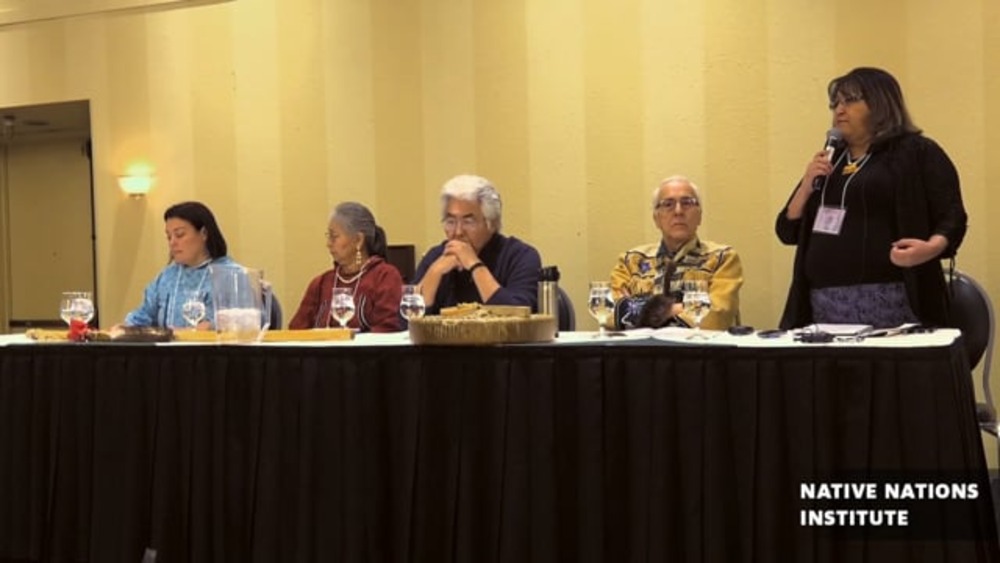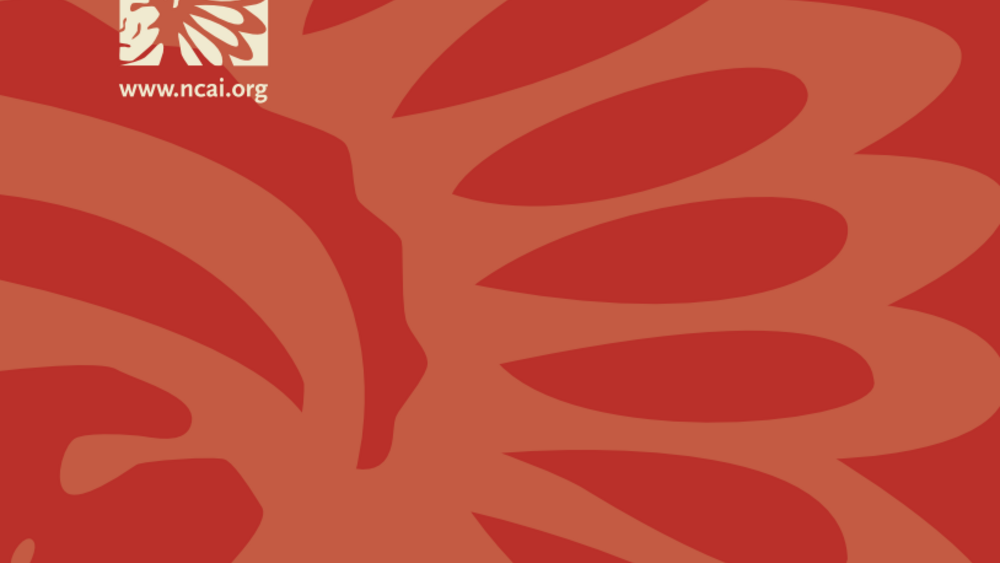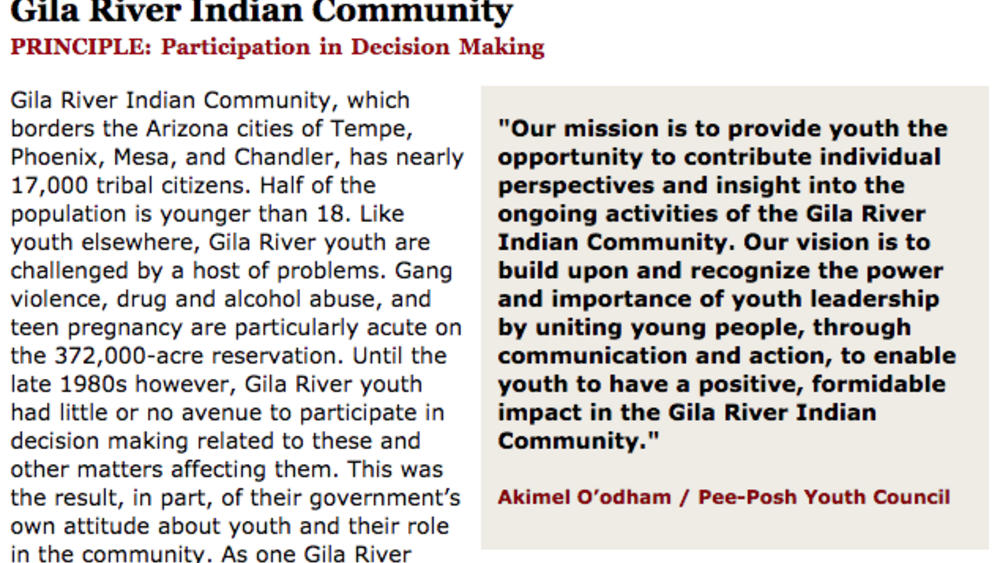Native leaders share what the role of a leader entails from studying the history of the tribe to listening to and learning from elders of the community; all the tools necessary to making informed decisions.
Additional Information
Jordan, Paulette. Native Nations Institute for Leadership, Management, and Policy. University of Arizona. Tucson, Arizona. March 25, 2010. Interview.
Luarkie, Richard. Native Nations Institute for Leadership, Management, and Policy, University of Arizona. Tucson, Arizona. October 1, 2012. Interview.
Miles, Rebecca. "What I Wish I Knew Before I Took Office." Emerging Leaders seminar. Native Nations Institute for Leadership, Management, and Policy, University of Arizona. Tucson, Arizona. March 23, 2011. Presentation.
Mitchell, Michael K. Native Nations Institute for Leadership, Management, and Policy, University of Arizona. Tucson, Arizona. 2008. Interview.
Norris, Jr., Ned. Native Nations Institute for Leadership, Management, and Policy, University of Arizona. Tucson, Arizona. 2012. Interview.
Peacock, Robert. "What I Wish I Knew Before I Took Office," Native Nation Rebuilders program, Bush Foundation. Cloquet, Minnesota. July 14, 2011. Presentation.
Pouley, Theresa M. "Reclaiming and Reforming Justice at Tulalip." Emerging Leaders Seminar. Native Nations Institute for Leadership, Management, and Policy, University of Arizona. Tucson, Arizona. March 26, 2008. Presentation.
Transcript
Michael Mitchell:
"Don't be ashamed to say you've got stuff to learn to be a politician. And I might take the first six months and learn my leadership craft well. I need to consult with more established leaders. I need to talk to the staff. I need to go seek feedback from community people, from elders. You spread yourself out there and tell them you're not here to make decisions right away because if you don't know what kind of decisions you have to make and you're making decisions, it's likely to be wrong. It's likely to be selfish and it'll come back on you. So give yourself a little bit of time to know what people, why things are in place and what people are feeling, what's on their mind. And for a good leader, he'll always go around, the first six months of his term, and listen. And it's not a crime to stand up and say, ‘I've got a little bit to learn here and I see some chiefs here that have been here for a while. I know some people here who used to serve on council. I'm going to make sure I learn my craft well.' You get a lot of respect in the community if you can say that."
Rebecca Miles:
"What I can't tell you enough is do your research. What you're going to hear, and you've probably already heard, tribal leaders, let's say the person that you beat to get in office, is going to be at the public meeting and say, ‘You don't know what you're doing and yada, yada...' And I did. I pulled out every resolution and did a timetable of when we got in this settlement. The first question for the first five months was, ‘How did we get here?' Well, I needed to know that and I needed to be telling my people, how did we get here? I looked at every decision that was made and I found every resolution that appointed members of our council to negotiate this settlement. They were appointed as the negotiator. And so I was able to put faces and accountability to the tribe, that it's not just the person who just walks in, this is a bigger deal. And so research is important as well to avoid continuously making mistakes and not being accountable."
Paulette Jordan:
"That's the thing. You're jumping on the treadmill, going 90 miles an hour. You're having to do research left and right. You really have no time to sleep because you have to read everything and making sure you're prepared for tomorrow's meeting or council session and that you can ask the right questions so that you make the right decision. But the tough thing is you have to get your rest, pay attention, make sure that you do ask the right questions from the right people and making sure you connect with your fellow leaders. Because for me, and that's what made it easy for me because my fellow leaders are people that I've known all my life and respected and felt like I had a mentor relationship with them. So I guess that's why I'm fortunate, but if I didn't have that I wouldn't be able to be as successful in terms of understanding and trying to make positive or a good decision for our people."
Theresa Pouley:
"Your tribal court system is part of your government every bit as much as any other department. And the fact that we have separation of powers doesn't mean we have a separation of problems. You and I all have the same problems. It doesn't mean that we have separation of solutions. Because I'm a judge, I know a variety of things about promising practices. Because you're tribal council people, you know a variety of things. If we put our heads together, we can get it done."
Robert Peacock:
"You have to be ready to take and make decisions but not always with 100 percent of the information. And I think good leaders do that, they have people around them that know a little bit about everything and you take all of that information and you make decisions based on the best information that you can get. And I've had people that I don't personally get along with that are intelligent, smart and knowledgeable and I use their information. I don't have to go and have lunch with them or anything else but I do have to listen to them and I do have to take their knowledge into the overall concept of decision making. And then sometimes you'll only get 70, 80 percent of a concept of what's going on, you have to take that risk. You have to be able to pull the trigger because if you wait for 100 percent it's never going to happen, you're never going to pull the trigger, you're never going to be able to take advantage of it and move. And if you see that you probably made a bad decision, deal with it. That's only that decision, it's not the rest of the world, it's not everything else. You don't get anyplace if you don't make mistakes but you have to get past those mistakes and make some more decisions and you learn from those so that the next time the situation comes by you can set it up differently or make a different decision. So pick yourself back up, all the time, because if you don't, then you're done."
Ned Norris, Jr.:
"I like to do assessments. I like to do that mainly because you think you might understand what the situation is and you think you might have the right answer as to how you're going to attack that situation or address that situation. But too many times we go into the situation not realizing what the impacts of your addressing that issue is going to be. So for me, I like to, ‘okay, I agree with you. Let's address that issue, but let's make sure we understand what it is we're dealing with and whether or not we have the ability to address that issue,' because to me, to do something with half of an understanding, really creates, to some extent, false hope. Because people are going to see that you're moving in that direction. And if you're not able to fulfill that movement, you're going to stop. And people may have liked to have seen what you were moving on but don't understand, ‘why did you stop? We had hope in that. We thought you were going to address that issue.' ‘Well, you know what, we do our homework and we couldn't move it any further. That's why.' I think that we need to be, if we're going to make a decision as a tribal leader, we need to fully understand the ramifications of what that decision is. And to the best of our ability, make informed decisions about decision we need to make, and then move forward."
Richard Luarkie:
"In our environment, in our council environment, you often hear the reminder [Laguna language], which means do it properly, take your time, be diligent. It doesn't mean sit there for six or eight months. It means be analytical, be objective in your decision-making, turn the stones that you need to turn, but do it properly. And so I believe that for us, decision-making and being able to frame decisions in a manner that is diligent is critical for us. So those are all very important elements for us in our decision-making."



